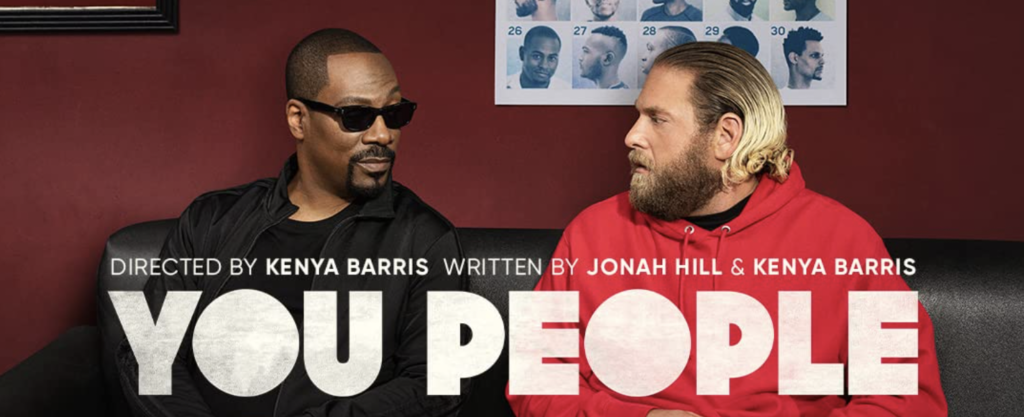I was looking forward to watching “You People” when it was released Jan. 27 on Netflix. The movie features several renowned actors: Lauren London, Jonah Hill, Eddie Murphy and Julia Louis-Dreyfus. With the latter three especially known for their comedic talent, “You People” seemed like a surefire winner.
Boy, was I wrong.
Here’s a quick summary of the lowlights: Hill plays a Jewish broker, Ezra, who co-hosts a podcast on the side and dreams of podcasting full time. He meets a Black fashion designer, Amira, who often faces workplace discrimination because of her race and gender in an industry dominated by white males. The two agree to marry early on, and the rest follows the culture differences between their families and how they deal with them. Unfortunately, much of the film centers on the conflict between Akbar (Amira’s father, played by Murphy) and Shelly (Ezra’s mother, played by Louis-Drefyus).
Akbar is a stoic, strict father who rarely laughs — a stark contrast from Murphy’s usual comedic roles – while Shelley lacks any sort of tact and tries too hard in every situation — the polar opposite of Louis-Dreyfus’s no-nonsense character Elaine in “Seinfeld.” Aside from the strange personalities of these characters, the film frequently veers from the main plot and tries to incorporate pop-culture references, throwing off the rhythm of the story.
In one particularly difficult-to-watch scene, Ezra and his podcast co-host discuss “Take Care Drake” vs “CLB Drake.” And the film’s strange obsession with hip-hop doesn’t stop there — Ezra’s father, who barely talks in the movie, somehow manages to bring up Xzibit in every conversation he’s a part of.
In another extremely cliche scene, Akbar brings Ezra to a barbershop in a Crip neighborhood while Ezra is dressed in red, a color that is frowned upon in that neighborhood. Ezra subsequently shows off at a basketball court in the neighborhood while a surprised Akbar goes live on Instagram. All of these scenes try too hard to be “cool” and cater to younger viewers, but they completely miss the mark. A 40-year-old Jonah Hill rambling about Drake for two solid minutes is likely relatable to very few, and funny to an even smaller subset of viewers.
But despite the cringey moments, perhaps the film’s biggest flaw is that none of the characters are likable. A good rom-com will have the viewer on the edge of their seat rooting for the relationship to succeed, but Ezra and Amira’s dysfunctional relationship is so painful to watch that one almost wishes for the opposite to happen.
From the get-go, romantic moments between the two are left off-screen in favor of dining-table discussions between Akbar and Shelley, which often seem more like a competition of who can say something more politically incorrect. One of the worst scenes features the two having a back and forth concerning slavery and the Holocaust. The idea that parents in real life would be this inconsiderate and obtuse is far-fetched for most and frightening to imagine.
“You People” feels almost satirical at times, but never completely crosses the line into being a parody, although it might have worked better had it been one. The exchanges between parents and their children are flat out unbelievable for much of the film. More than once I found myself asking “Who actually talks like this?”
Sure, at times, “You People” is funny. It’s hard not to laugh at least a few times with a cast of this level, especially when Murphy is allowed to deviate from Akbar’s character and poke fun at Ezra. But these rare comedic moments don’t justify its nearly 2-hour runtime, especially when nothing is happening for the bulk of the story.
The film attempts to acknowledge the difficulties of a relationship between people of different cultures. However, rather than work through their differences, the families instead opt to spiral into a cycle of rude remarks and outright racism at times, negating any insightful commentary the film makes on race relations and making it uncomfortable to watch — never a good sign for a romantic comedy. Films with the subject matter of “You People” are especially necessary today, but not if they’re executed with this little tact and care.
























